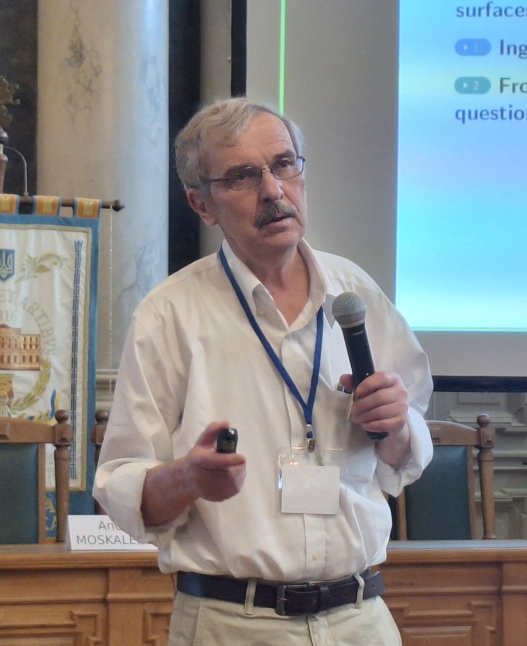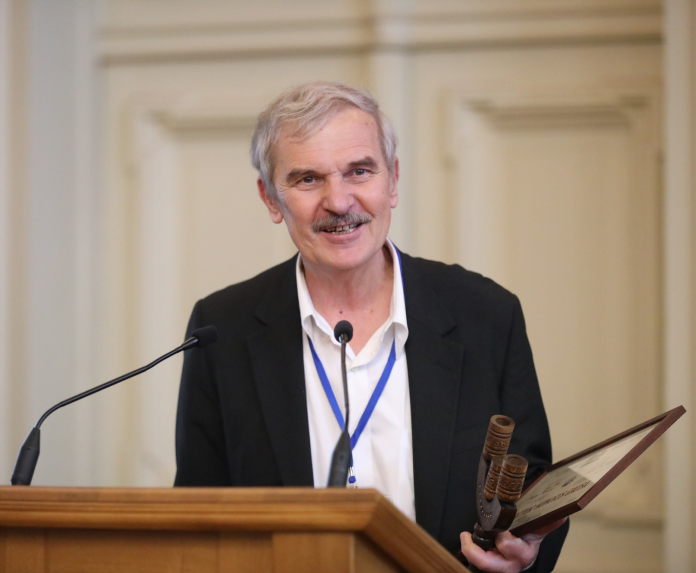About Institute / Doctors honoris causa / Orest Pizio
Orest Pizio

By the decision of the Academic Council of the Yukhnovskii Institute for Condensed Matter Physics of the NAS of Ukraine dated 29 May 2025, the title of Doctor honoris causa was conferred on Professor Orest Pizio (National Autonomous University of Mexico, Mexico) for his outstanding achievements in the study of soft matter, his contribution to the development of the Lviv school of statistical physics of liquids and solutions, and his long-standing and fruitful cooperation with the Yukhnovskii Institute for Condensed Matter Physics of the NAS of Ukraine.
Orest Pizio was born on 30 January 1952 in Lviv. In 1973, he graduated with honours from Lviv University. Between 1973 and 1990, he worked first at the Department for Statistical Theory of Condensed States (STECS) and later at the Department for Solution Theory of the Lviv Branch of the Institute for Theoretical Physics of the Academy of Sciences of Ukraine. In 1980, he defended his Candidate of Sciences (PhD) thesis entitled "Separation of the Reference System in Multicomponent Systems of Charged Particles with Complex Electrostatic Structure" under the supervision of I. Yukhnovskii and M. Holovko. Since 1984, he has held the position of Senior Research Fellow. From 1990 to 1997, he worked at the Institute for Condensed Matter Physics of the National Academy of Sciences of Ukraine, continuing his research in the Department of Solution Theory. Since 1993, he has been working at the Institute of Chemistry of the National Autonomous University of Mexico (Mexico City) as a senior researcher, heading a research group focused on statistical-mechanical modelling of physicochemical properties of liquids and solutions.

Early scientific research of Orest Pizio was devoted to the development of methods for the reference system treatment of short-range repulsive interactions in the theory of dense systems with electrostatic interactions, as well as to the use of the mean-spherical approximation for determining screened potentials that serve as the basis for cluster expansions of such systems. This approach made it possible to calculate the radial distribution functions of ionic melts and compare them with corresponding experimental data obtained from neutron scattering on isotopically substituted samples. It also allowed the description of the unusual properties of dense systems with electrostatic interactions, in particular the emergence of a negative branch in the dielectric function. During this period, he established close scientific contacts with Hungarian researchers – Imre Ruff, Laszlo Pusztai, András Baranyai, and others, which have continued to this day.
Endowed with remarkable organisational talent, Orest Pizio made a substantial contribution to the development of the Institute for Condensed Matter Physics of the National Academy of Sciences of Ukraine. While still working in Lviv, he played an active role in co-organising the International School on Ionic Solvation (1983) and the 2nd Soviet-Italian Symposium on Mathematical Problems of Statistical Physics (1985), serving as the scientific secretary of both events. He also co-supervised the Candidate of Sciences (PhD) thesis of A. Trokhymchuk, successfully defended in 1985.
At the Institute of Chemistry of the National Autonomous University of Mexico (UNAM), Orest Pizio’s scientific interests have significantly expanded towards the development of statistical-mechanical methods for describing spatially non-uniform liquids and solutions, including integral equation approaches, density functional theory, and computer simulations. For many years, O. Pizio pursued this line of research in close collaboration with the renowned Polish scientist Professor Stefan Sokołowski (Maria Curie-Skłodowska University, Lublin), who has also been an Honorary Doctor of the Institute since 2019. This research area includes a broad range of scientific problems, such as the description of spatially homogeneous and inhomogeneous ionic systems, studies of structure and phase transitions in non-uniform associating fluids, investigations of polydisperse inhomogeneous fluids, and the development of new theoretical approaches for describing fluids in porous media. Within these lines of research Orest successfully collaborated and co-authored several publications with D. Henderson, L. Blum, V. Vlachy, A. Patrykiejew, C. Vega, W. Rzysko, B. Hribar, M. Luksic and An. Malijevsky. Orest Pizio is the author and co-author of about 300 scientific papers, as well as several review articles and book chapters in collective monographs.
After moving in Mexico, Orest Pizio continued to maintain close and productive ties with the Yukhnovskii Institute for Condensed Matter Physics in Lviv. A number of the researchers from the Institute received valuable training under his supervision as visiting scientists, including M. Holovko, A. Trokhymchuk, Yu. Duda, A. Kovalenko, T. Patsahan, Ya. Ilnytskyi, Yu. Kalyuzhnyi, and others. Their visits to Mexico resulted in many joint publications and the development of long-term scientific collaboration. The research group led by O. Pizio and the Department for Soft Matter Theory have always worked in closely related areas, complementing efforts of each other. O. Pizio is a member of the Supervisory Board of the Yukhnovskii Institute for Condensed Matter Physics of the NAS of Ukraine, an active participant in international conferences held in Lviv, a member of the Programme Committee of the StatPhys conference series, as well as a regular contributor and editorial board member of the Condensed Matter Physics journal, issued by the Yukhnovskii Institute for Condensed Matter Physics of the NAS of Ukraine. During his career Orest served our community as an editor of various special issues and as frequent reviewer of publications and research projects. For years he is teaching statistical thermodynamics within the postgraduate program in chemistry at the National Autonomous University of Mexico (UNAM) fostering young generations of researchers.